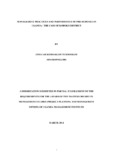| dc.description.abstract | This study examined the influence of management practices on the performance of Preschools in Koboko district, northern Uganda. A total of 96 respondents, including 20 key informants and 76 employees, participated in the study. Primary data was obtained using a questionnaire and a structured interview guide. Data was analysed using descriptive and inferential quantitative as well as qualitative methods. The findings revealed that a significant positive relationship existed between management practices and pre-school performance. Pre –schools giving employees opportunity to participate in decision making, providing appropriate rewards, implementing good human resource development strategies and implementing performance management, increased the performance of these institutions. However, pre-schools still have poor rewards administration, decision making and inadequate access to useful information and working resources for employees’. This has subsequently lowered the performance of pre-schools in the Koboko. Low performance is exhibited by failure to; achieve standard EDC goals, maintain modern learning environment and resources have clear performance goals and good rewards administration. Pre-schools should increase decision making by encouraging individual and collective employee participation in the decision making processes especially on issues that concern work performance. Schools need to come up with a modern incentive system that can truly enhance employee performance. The system should reward the more skillful, efficient and effective, innovative individual employees. Pre-schools should work hard to have reliable internet connectivity so that teachers can have access to affordable and practical teaching resources. Teachers should also be trained on how to use internet in issues such as downloading learning resources, relevant textbooks and lesson material. Pre-school authorities should modernize their performance measurement system of teachers. They should involve employees in designing the performance measurement framework. Key result areas and performance indicators should be published and known by every employee. | en_US |

